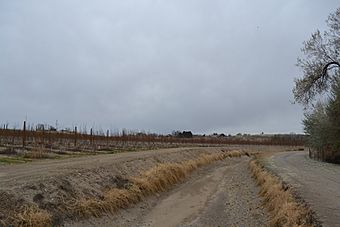Snake River Valley AVA facts for kids
| Wine region | |
 |
|
| Type | American Viticultural Area |
|---|---|
| Year established | 2007 |
| Country | United States |
| Part of | Idaho, Oregon |
| Climate region | Continental |
| Total area | 8,263 square miles (21,401 km2), 5,280,000 acres (2,140,000 ha) |
| Size of planted vineyards | 1,800 acres (728 ha) |
| No. of vineyards | 46 |
| Grapes produced | Cabernet Franc, Cabernet Sauvignon, Canadice, Chardonnay, Cinsault, Gewurztraminer, Grenache, Lemberger, Malbec, Merlot, Mourvedre, Riesling, Syrah |
| No. of wineries | 15 |
The Snake River Valley AVA is a special area in Idaho and Oregon where grapes are grown to make wine. "AVA" stands for American Viticultural Area, which is a fancy way of saying it's a recognized grape-growing region. This area was officially recognized in 2007. This means it has unique conditions that are great for growing certain types of grapes.
For a wine to say it comes from the Snake River Valley AVA, at least 85% of the grapes used to make that wine must have been grown right here. This helps make sure the wine truly represents the region. The AVA includes many counties in southwestern Idaho and two counties in eastern Oregon.
This region is home to 15 wineries and 46 vineyards. About 1,800 acres (728 hectares) of land are dedicated to growing grapes here.
Weather and Grape Growing
Why the Climate is Special
The Snake River Valley is located at the same latitude (distance from the equator) as another grape-growing area in Oregon called the Umpqua Valley AVA. However, the Snake River Valley has much bigger changes in temperature between day and night. This is called "diurnal temperature variation."
Most vineyards in this region are very high up, from 2,500 to 3,000 feet (762 to 914 meters) above sea level. Being so high up and more than 400 miles (644 kilometers) away from the Pacific Ocean means the ocean's cooling effect doesn't reach here. This causes the big temperature swings, which can be good for grape ripening.
 | Emma Amos |
 | Edward Mitchell Bannister |
 | Larry D. Alexander |
 | Ernie Barnes |

